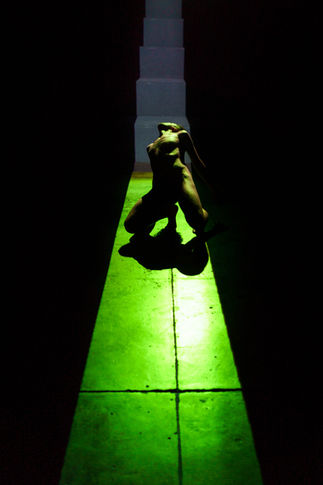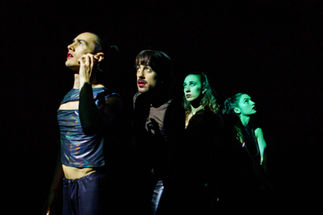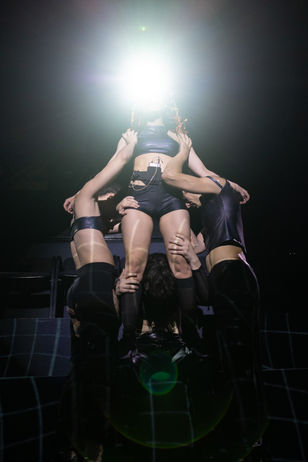17-18 ABR 2022 bra // 17-18 ABR 2023 MIS // 20-21 Sep 2024 CCK // 20-21 Nov 2025 ESP //

111
Stasis
3
obra inmersiva hipercontemporanea








7
.jpg)
FICHA TÉCNICO-ARTÍSTICA
Intérpretes (por orden alfabético):
Mariana Cinat, Lucía Cuesta, Martín Dodera, Manuel Pallero, Matías Viera
Coreografía (por orden alfabético):
Mariana Cinat, Lucía Cuesta, Manuel Pallero, Carla Rimola, Matías Viera
Dirección coreográfica:
Carla Rimola y Lucio Bazzalo
Música original compuesta
e interpretada por:
Sebastián Morell
Diseño y realización
de visuales e iluminación:
Lucio Bazzalo
Diseño de vestuario:
Daniela Chihuailaf
Asistente de vestuario:
Flavia Chihuailaf
Make up:
Bárbara Majnemer
Peinado:
Bea Belaustegui
Producción técnica:
Lucio Bazzalo
Colaboración técnica:
Ana Heilpern, Martín Dodera,
Manuel Benavidez
Operación técnica:
Manuel Benavidez;
Camilo Ortiz;
Ian Sadowskiy
Comunicación y prensa:
Mutuverría PR
Producción:
Mariana Cinat y Lucio Bazzalo
Dramaturgia y dirección:
Lucio Bazzalo
Stasis is an immersive, hybrid performance that blends Dance, Theater, and New Technologies.
In Estasis, the stage design immerses the audience in a different dimension.
The work invites the audience to enter the theatrical space in an unconventional way, positioning them within the piece, abducted by visuals that fill the room, enveloping the stage, the spectators, and the performers.
Group choreographies move across the stage and the bleachers, where bodies climb, roll, or let themselves fall, defeated by gravity and reflection.
Each of the four performers has their moment, competing for their time in the spotlight. In these moments, their real-time image is multiplied throughout the space—on walls, floors, and structures. They feel the need to share something about their life, recall a dream from the previous night, or express a thought on the world with the voice of an ironic proclamation that calls for examining the present.
Estasis is a work that crosses disciplinary boundaries and shifts the audience’s perspective, making them feel ‘inside’ the performance, as though they are part of everything happening. It challenges them from within, offering a proposal where live art permeates their body.
Synopsis
Four subjects, products of self-design, search for themselves while navigating the geographies of a digital matrix.
Amid bursts of obsessive thoughts, poetic impulses, and reflections of hyper-contemporaneity, the need for individual, collective, and global change emerges like a wild plant sprouting through digital asphalt.
On the surface of a mirror, a question takes shape:
Why don’t you change?Estasis es una obra escénica inmersiva, hibrida Performance, Danza, Teatro y Nuevas tecnologías.
stasis is an immersive, hybrid performance that blends Dance, Theater, and New Technologies.
In Estasis, the stage design immerses the audience in a different dimension.
The work invites the audience to enter the theatrical space in an unconventional way, positioning them within the piece, abducted by visuals that fill the room, enveloping the stage, the spectators, and the performers.
Group choreographies move across the stage and the bleachers, where bodies climb, roll, or let themselves fall, defeated by gravity and reflection.
Each of the four performers has their moment, competing for their time in the spotlight. In these moments, their real-time image is multiplied throughout the space—on walls, floors, and structures. They feel the need to share something about their life, recall a dream from the previous night, or express a thought on the world with the voice of an ironic proclamation that calls for examining the present.
Estasis is a work that crosses disciplinary boundaries and shifts the audience’s perspective, making them feel ‘inside’ the performance, as though they are part of everything happening. It challenges them from within, offering a proposal where live art permeates their body.
Synopsis
Four subjects, products of self-design, search for themselves while navigating the geographies of a digital matrix.
Amid bursts of obsessive thoughts, poetic impulses, and reflections of hyper-contemporaneity, the need for individual, collective, and global change emerges like a wild plant sprouting through digital asphalt.
On the surface of a mirror, a question takes shape:
Why don’t you change?

Four subjects, products of self-design, search for themselves while navigating the geographies of a digital matrix.
Amid bursts of obsessive thoughts, poetic impulses, and reflections of hyper-contemporaneity, the need for individual, collective, and global change arises like a wild plant sprouting through digital asphalt.
On the surface of a mirror, a question takes form:
Why don't you change?

EQUIPO
MÁS DATA












































